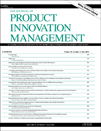 Ulrich Lichtenthaler, the management professor who has had 13 papers retracted, has a correction in the Journal of Product Innovation Management.
Ulrich Lichtenthaler, the management professor who has had 13 papers retracted, has a correction in the Journal of Product Innovation Management.
Here’s the text of the correction for “The Role of Champions in the External Commercialization of Knowledge, ” which is followed by the corrected tables:
Originally published in Journal of Product Innovation Management, 26, 4 (Lichtenthaler and Ernst, 2009). Regrettably, there were some unintended errors in the originally published Tables 2 (page 380), 3 (page 381) and 4 (page 382). The tables below have been corrected and should be substituted for the published tables. JPIM apologizes for these errors.
The paper has been cited nine times, according to Thomson Scientific’s Web of Knowledge.
The fact that only the JPIM is apologizing for the errors suggests that the publisher was responsible. After all, in one of the two Lichtenthaler retractions that have already appeared in the same journal, Lichtenthaler takes “sole responsibility.” And at many (but not all) publishers, errata, as distinguished from corrigenda, are reserved for publisher error.
We’ve asked the journal’s editor to clarify, and will update with anything we learn.
Hat tip: Philipp Hermanns
Like Retraction Watch? Consider supporting our growth. You can also follow us on Twitter, like us on Facebook, add us to your RSS reader, and sign up on our homepage for an email every time there’s a new post.
Notice says, “unintended errors.” Are most of their errors intended?
A study or survey is urgently needed, possibly by teams of psychologists, about how scientists whose papers have been retracted, feel. This wave of retractions, whether validated or not, is causing great consternation among many peers that I communicate with, and is making them VERY nervous, and anxious, not because they are necessarily guilty of anything, but because they are now afraid that the trust that they invested in the “peer review” process, which was supposed to be fail safe and secure, is now turning out to be porous, insecure, dangerous and potentially poisonous. Dangerous to their careers, dangerous to their profiles and dangerous to their resumes. This fear is very valid, I believe, and that is why scientists must hold publishers as accountable, if not more, for the whole process, now and before, that ever before. Most scientists I know, including myself, attempt to reach a state of perfection or excellence on their own. But we have limitations and perfection is of course never achieved. The submission to a target journal, still traditionally one of repute, which is more often than not associated with an IF, involves a process of trust by the scientist in the publisher, in the peer review process and in the methodology used to achieve, and guarantee, quality control. Until quite recently, let’s say 3-5 years ago, it was almost unimaginable to see the wave of retractions and post-publication peer review that we are now witnessing. And this is only the start, I believe. But the unease that this new trend has set in is causing irreparable damage, least of which is psychological. As always, a trend is set, and only years after that event will the psychological damage be assessed, by that time, possibly too late to recover a situation that could have been avoided. Although there seems to be this apparent delight by some in the villification of scientists, we are reminded that retractions are not a form of revenge, and should only be used to correct the academic literature. There are undoubtedly honest victims among those scientists whose papers were retracted, and blame can be assigned to multiple reasons, and parties. I call on a deep psychological assessment of these “victims” because their legacy may present a newly emerging danger, either to science, or to society. For example, is anyone following up on scientists whose papers were retracted, bith in terms of career and mental state? I feel not. Once trashed, a scientist is then left to fend for themselves with no, or very limited, support structures, even in the “developed” world. My apologies for this soliloquy, but as we seek to correct the literature, it is important to also keep our hearts attentive to the mental state of all possible victims.
Thanks for asking the editor and the journal for more clarifications- they really should be forthcoming with those. JPIM is a very good journal. It is considered in the top 20 management journals at my university. The production process at many journals is quite rushed and outsourced. Many journals’ production process often try to get only one round of revisions when actually two or more would catch more mistakes.